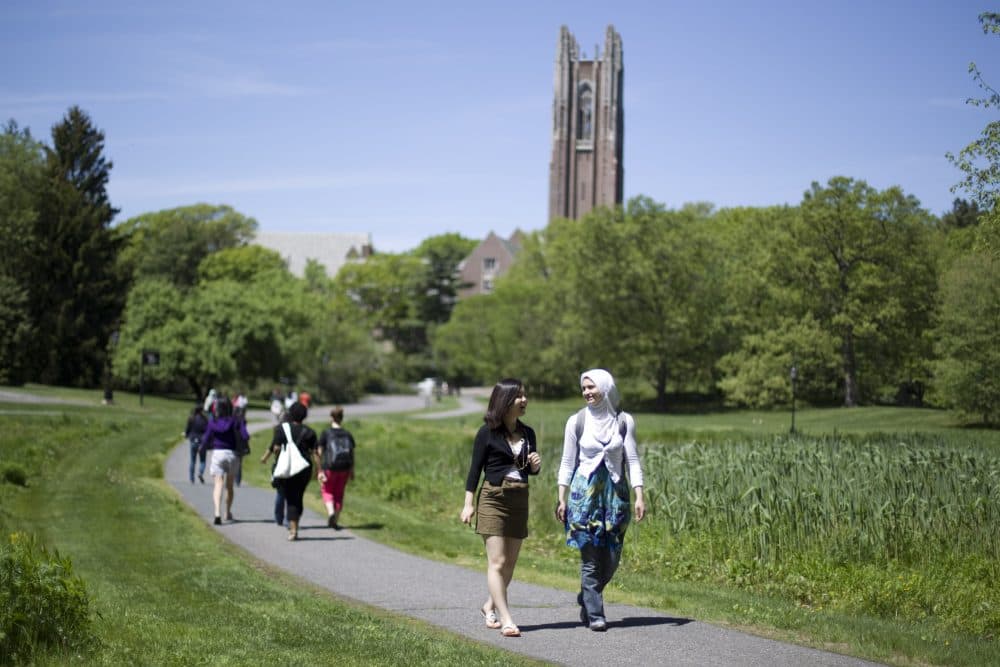Advertisement
How Wellesley Plans To Address The Mental Health Of Its Asian-American Students
Resume
As a senior at Wellesley College, Lily Luo would often spend her evenings traveling to Boston to talk out her fears and frustrations with other Asian-American women.
"It would take me hours to get there and get back," Luo said, "but I got to a point in my life where I was like 'I need this and I am going to make the time for my mental health.' "
Luo was participating in a research study called AWARE — Asian Women’s Action for Resilience and Empowerment — that's part of a five-year study conducted by Boston University researcher Hyeouk Chris Hahm. Hahm, an associate social research professor, had been called on by the National Institutes of Health to study the mental health of second-generation Asian-American women.
Asian-American women ages 18 to 24 have the nation's second-highest suicide rate among women in this age group, Hahm said; in that segment of the population, only Native American women's rate is higher. (Her research is based on NIH 2012 data; 2014 numbers from the Centers for Disease Control place Asian-American women ages 15-24 third, after Native American and white women.)
"Their suicide rate is higher than white and black and Hispanic," said Hahm. "So we’re talking about a really, really serious issue."
For Luo, her struggles started as a young girl. She was born in Ohio but moved frequently: first to China, then back to the states and then again to China for high school.
“When you’re a kid, you want to stay in one place, you know?” said Luo. “You know those kids who live in a house and the parents mark when you’re growing on the wall? We never got to do that because we moved so much.”
Luo’s transitory childhood, along with navigating two cultures, was a struggle.
“You know, when I was growing up I wasn’t exactly proud that I was Chinese-American," she said. "I think my parents felt like I was ashamed of them or ashamed of their accents. That was a huge source of conflict.”
Straddling two cultures is a familiar story for the children of immigrants. Socially, Western and some Eastern societies operate differently. Hahm said Asian cultures typically value the “we” — family, groups and teams. An Asian person's identity is often shaped by being part of a group. American culture, in contrast, typically values the “self,” praising a person for excelling as an individual and being unique.
Hahm believes this causes a fractured identity, specifically for Asian women born to immigrant parents in the United States. In her research, she also found that many shy away from therapy or counseling.
"Asian-American women feel that there is no appropriate, culturally sensitive mental health services specifically for this Asian-American woman,” Hahm said.
Based on her findings, the NIH awarded Hahm a second grant, to create an intervention.
This fall, Wellesley College will be the first school in the nation to implement the intervention, which is part counseling, part support group. Nearly 22 percent of Wellesley’s students are Asian, and a large percentage of them participated in Hahm’s study.
“We believe that the whole student needs to be supported and that for students to understand themselves, they need to understand their own history, family structure, cultural background, as well as the gendered and racial structures that influence the way they see themselves and are seen by others,” said Stephen Chen, a professor of psychology at Wellesley College.
Luo said she wishes AWARE had been at Wellesley when she was an undergrad. During an internship on Capitol Hill a few summers ago, Luo said, she was the only Asian-American. And as she looked around, she noticed something.
“Sometimes when you don’t mention that you’re not white, white people forget it," she said. "But the minute you start reminding them, 'Hey, I didn’t grow up with the same traditions as you,' then they remember 'Oh, you’re not one of us,' and then they start shutting you out of things.”
After being a part of Hahm’s study, Luo realized she didn’t want to be silent about the challenges of being a Chinese-American. She said she wants other Asian-American women to know that they can be fully Asian and American, and that it’s OK to talk out loud about how hard navigating both identities can be.
“I think that’s the beauty of AWARE," Luo said. "It doesn’t just wait for you to come to it; it’s actually proactive about giving help to Asian-American women and saying specifically you should go to therapy. That’s powerful.”
Correction: Asian-American women ages 18-24 have the highest suicide rate for women of that age, not for Americans overall, as an earlier version stated. WBUR regrets the error. In addition, we updated the headline to clarify Wellesley's role and updated the story with recent data from the Centers for Disease Control.)
This article was originally published on September 12, 2016.
This segment aired on September 12, 2016.
